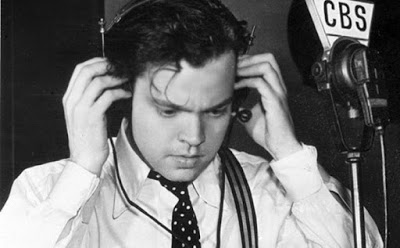Listen Here! 21 Hours Of Orson Welles’ Mercury Theater On The Air

As a teenaged stage actor in the ’30s, Orson Welles helped pay the bills by lending his mellifluous baritone voice to scores of radio programs in New York. Before too long was a genuine radio star, making over $1500 a week in Depression dollars.
In 1935 he joined the newly created Federal Theater Project, a division of FDR’s Works Progress Administration. The Federal Theater Project was designed to put skilled people to work staging plays. Performances were open to the public and often took place in areas that had been deprived of any kind of theater, let alone great theater. Welles first production was Macbeth, performed in Harlem with an all African-American cast. Not only did it draw audiences, it became a bona fide break-out success, and toured the country. Welles continued to work in radio and used his earnings to supplement the show’s budget. President Roosevelt, according to Welles, called him “the only operator in history who ever illegally siphoned money into a Washington project.”
After two years of success, the Federal Theater Project ran into political objections in Washington, ironically for criticism of Italian dictator Benito Mussolini, and was defunded. Welles and his favorite collaborators defected and created the Mercury Theater in 1937. The Mercury Theater now benefited from Welles’ years of experience staging and directing plays, and of course his genius. The productions were modern, innovative and breathtaking.
The Mercury became so famous and esteemed that radio, Welles’ constant source of funding during these creative years, came calling and Welles and company were engaged to create a 13 week series of literary adaptations called “The Mercury Theater On The Air.” One of the most famous broadcasts in history was a Mercury episode, the famous and brilliant “War Of The Worlds” adaptation that many listeners believed to be real.
The series ran for 22 episodes before creative differences impelled Welles to pull the plug on it.
Here, on archive.org, are most of the episodes of the series, in mp3 form.
These make great listening for long drives, by the way. Enjoy.










